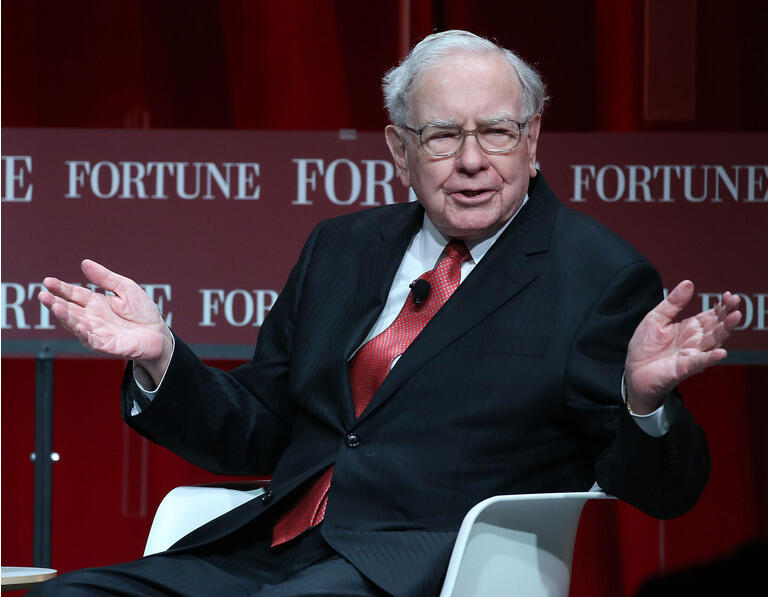Berkshire Hathaway Is Undervalued by 17%
Seeking Alpha published my article: “Berkshire Hathaway Is Undervalued By 17%”.
Berkshire Hathaway Is Undervalued By 17%
Summary
- Since Berkshire had operating earnings of $24 billion over the past 12 months, all of Berkshire’s businesses are being valued by the market at less than 15 times earnings.
- If Berkshire’s businesses were conservatively valued at 20 times operating earnings, then they would have an enterprise value of $480 billion.
- Subtracting the float of $142 billion would then result in an equity value of $338 billion.
- Adding $338 billion (businesses) to $452 billion (stock portfolio plus cash) results in an overall equity valuation of $790 billion.
- Then Berkshire’s current market valuation of $654 billion represents a 17% discount from my calculation of its intrinsic value.

Warren Buffett has stated on numerous occasions that he would buy back shares of Berkshire Hathaway only at prices that are below his estimate of their intrinsic value. In Berkshire Hathaway’s Form 10-Q for the second quarter of 2021, released on August 7, Berkshire reported that it bought back $6.0 billion of its shares during the second quarter, approximating the $6.6 billion it repurchased in the first quarter. Furthermore, its repurchase program continued in the third quarter, with an additional $1.8 billion of its shares being acquired through July 26. The average price paid per Class A share by Berkshire in May and June of 2021 slightly exceeded $432,000. Berkshire’s closing price on August 13, $433,124, approximates this average purchase price.
Since Warren Buffett considers Berkshire to be undervalued, then what is its intrinsic value? Why is it undervalued? This article will address both of these questions.
As of June 30, 2021, Berkshire Hathaway’s (NYSE:BRK.A) (NYSE:BRK.B) stock portfolio ($308 billion) plus cash ($144 billion) equal $452 billion. Its current market value, as of August 13, equals $654 billion. Subtracting $452 billion (stock portfolio plus cash) = $202 billion. Adding its insurance float (expected future claims on its insurance policies) of $142 billion (June 30) results in an “enterprise value” of $344 billion for all of its 60+ businesses including the major segments of insurance, BNSF Railroad, and Berkshire Hathaway Energy.
Since Berkshire had operating earnings of $24 billion (trailing 12 months from June 30), all of Berkshire’s businesses are being valued by the market at less than 15 times earnings. Currently, the S&P 500 is being valued at approximately 30 times earnings. If Berkshire’s businesses were conservatively valued at 20 times operating earnings, then they would have an enterprise value of $480 billion. Subtracting the float of $142 billion would then result in an equity value of $338 billion. Adding $338 billion (businesses) to $452 billion (stock portfolio plus cash) results in an overall equity valuation of $790 billion. Then Berkshire’s current market valuation of $654 billion represents a 17% discount from my calculation of its intrinsic value, which translates into a Class A share price of approximately $524,000. Berkshire’s closing price on August 13 was $433,124.
If Berkshire’s businesses were valued at 25 times operating earnings, then they would have an enterprise value of $600 billion. Subtracting the float of $142 billion would then result in an equity value of $458 billion. Adding $458 billion (businesses) to $452 billion (stock portfolio plus cash) results in an overall equity valuation of $910 billion. Then Berkshire’s current market valuation of $654 billion represents a 28% discount from this equity valuation, which equates to a Class A share price of approximately $604,000.
This estimate of Berkshire being conservatively valued at a 17% discount to intrinsic value, and by as much as 28%, is consistent with Warren Buffett buying back shares that he believes to be undervalued.
But why are they undervalued? Possible explanations include that the conglomerate structure of Berkshire may make it more difficult for analysts and investors to estimate their true value. Warren Buffett’s age (he turns 91 on August 30) is an additional risk factor. However, Berkshire has a succession plan in place with Vice Chairman Greg Abel, who currently runs all of Berkshire’s non-insurance operations, having been selected to become the next CEO. Vice Chairman, Ajit Jain, who currently runs Berkshire’s insurance operations, is likely to continue in that capacity. Current portfolio managers Ted Weschler and Todd Combs, each with a stellar investing record, would manage Berkshire’s portfolio of common stocks.
Warren Buffett has built his wealth and reputation by identifying and investing in undervalued stocks. Currently, the one stock in which he is investing billions of dollars is Berkshire Hathaway.
Since the stock market is not efficient in the short run, many stocks are undervalued from time to time. Berkshire Hathaway is one of them.





Exceptionally well-done!
The undervaluation may be looked at from different angles. And, as you stated, the undervaluation of the operating subsidiaries is palpable. However, viewing the same numbers from a different angle, the market is also grossly underestimating a power that BRK holds that most do not: at any time, BRK could declare a massive Special Dividend; it could start a hefty Regular Dividend (following Henry Singleton’s lead of not paying a regular dividend — for decades — and then subsequently doing so; or BRK could make a tender offer for a large swath of undervalued stock.
I.e., the firepower that BRK currently holds at bay in its arsenal is extremely potent with roughly $452 Billion in Stock and Cash, as you noted. And that firepower is passively ignored by Wall Street at the peril of showing its foolishness. Despite not yet realizing on its implied power, the arsenal continues to grow stronger.